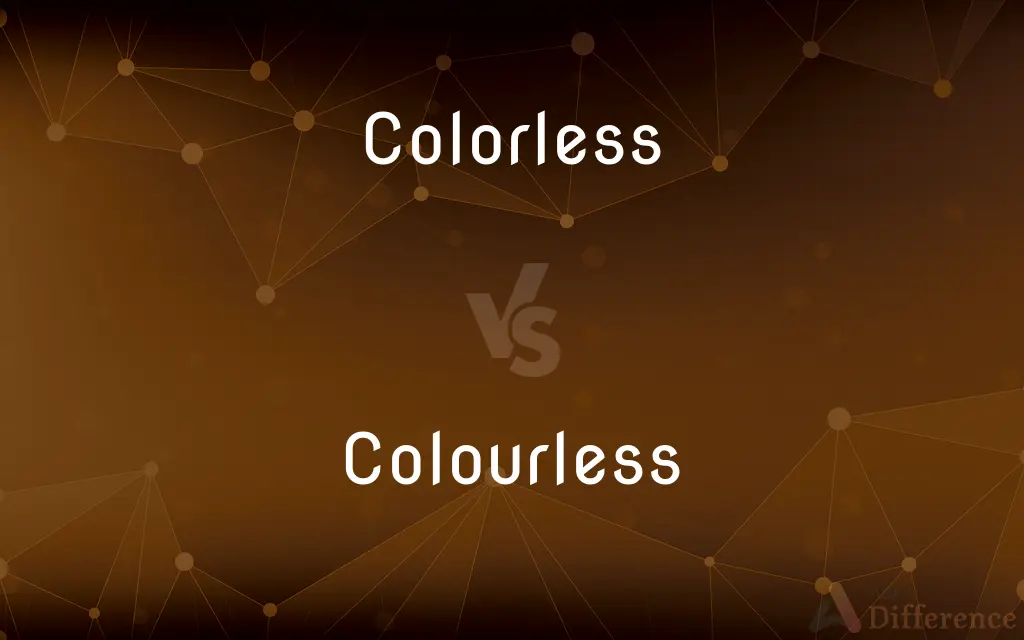Colorless vs. Colourless — What's the Difference?
Edited by Tayyaba Rehman — By Fiza Rafique — Updated on April 2, 2024
Both terms describe the absence of color, but "colorless" is the American English spelling, while "colourless" is used in British English.

Difference Between Colorless and Colourless
Table of Contents
ADVERTISEMENT
Key Differences
Colorless and colourless both refer to objects or substances that lack color, appearing transparent, white, or devoid of any distinct hue. The primary difference between the two lies not in their meaning but in their usage across different varieties of English. "Colorless" is the preferred spelling in American English, which is known for its tendency to simplify words from their British forms. On the other hand, "colourless" is the standard spelling in British English, reflecting a broader pattern of maintaining more traditional spellings that include the letter "u" in words like "colour," "favour," and "honour."
In scientific contexts, where precision and clarity are paramount, the choice between "colorless" and "colourless" can also indicate the author's or publication's linguistic preference, but it does not affect the interpretation of data or results. For example, a colorless gas or a colourless solution in a chemistry paper would be understood universally, regardless of the spelling variation. This universality underscores the importance of context and audience in scientific writing and publishing.
In literature and everyday language, the use of "colorless" or "colourless" may subtly reflect the cultural or geographical identity of the writer or speaker. American authors and speakers prefer "colorless" to describe something lacking in vividness or interest, both literally and metaphorically, whereas British writers and speakers would naturally opt for "colourless." This distinction extends beyond mere spelling to embody the linguistic nuances that distinguish American and British English.
Furthermore, the choice between these spellings can sometimes serve as a clue to the intended audience or origin of a text. Publishers and editors often adapt spelling to suit the preferences of their target readership, which means that a book intended for the American market might use "colorless," while the same book published for the U.K. audience would use "colourless." This adaptability reflects the global nature of English and the sensitivity of publishers to linguistic preferences.
Despite the spelling differences, it's crucial to note that the choice between "colorless" and "colourless" does not imply any difference in meaning or connotation. Both spellings communicate the same absence of color, serving as a reminder that English is a diverse and adaptable language, capable of reflecting a wide range of cultural and regional variations without losing its inherent ability to convey clear and precise meanings.
ADVERTISEMENT
Comparison Chart
Spelling
Colorless
Colourless
Usage
Preferred in the United States
Preferred in the United Kingdom and other regions using British English
Context
Used in scientific, literary, and everyday language
Same as left column, but reflects British spelling conventions
Connotation
Indicates absence of color
Same as left column
Global Recognition
Universally understood, but indicates American English
Universally understood, but indicates British English
Compare with Definitions
Colorless
Lacking in color; transparent or clear.
The colorless liquid in the vial was pure water.
Colourless
Lacking in colour; transparent or clear.
She wore a dress of the finest colourless silk.
Colorless
Devoid of vividness or distinctiveness.
The room's decor was bland and colorless.
Colourless
Devoid of vividness or distinctiveness.
The narrative of the book was criticized for being dull and colourless.
Colorless
Not influenced by racial or ethnic biases.
The organization aims for colorless justice.
Colourless
Absent of any hues that can be seen.
The jewel's colourless brilliance made it highly valuable.
Colorless
Absent of any hues that can be seen.
The diamond was prized for its colorless clarity.
Colourless
Without interest or character.
His presentation was informative but somewhat colourless.
Colorless
Without interest or character.
His colorless speech failed to capture the audience's attention.
Colourless
Not influenced by racial or ethnic biases.
The policy was commended for being fair and colourless.
Colorless
Lacking color
A colorless liquid.
Colourless
Having little or no colour.
Colorless
Pale; pallid
A colorless face.
Colourless
(of a liquid) Water white.
Colorless
Lacking animation, variety, or distinction; dull.
Colourless
Lacking in interest or variety.
Colorless
Standard spelling of colourless
Colourless
Lacking in variety and interest;
A colorless and unimaginative person
A colorless description of the parade
Colorless
Without color; not distinguished by any hue; transparent; as, colorless water; a colorless gas.
Colourless
Weak in color; not colorful
Colorless
Free from any manifestation of partial or peculiar sentiment or feeling; not disclosing likes, dislikes, prejudice, etc.; as, colorless music; a colorless style; definitions should be colorless.
Colorless
Having lost its normal color.
Colorless
Lacking in variety and interest;
A colorless and unimaginative person
A colorless description of the parade
Colorless
Weak in color; not colorful
Common Curiosities
Can the terms colorless and colourless be used interchangeably?
Yes, they can be used interchangeably, though it's best to stick with one spelling convention based on the intended audience or regional norms.
Do colorless and colourless only refer to physical appearance?
While they primarily describe the absence of color in a literal sense, both terms can also be used metaphorically to describe something lacking in vividness or distinctiveness.
How do I decide whether to use colorless or colourless in my writing?
Your choice should be guided by the version of English you are using. Use "colorless" for American English and "colourless" for British English.
Is the spelling difference ever a topic of debate?
While there are debates on spelling conventions between American and British English, the choice between colorless and colourless is generally straightforward and follows the broader patterns of linguistic preference.
Has the preference for either spelling changed over time?
The preference is stable, reflecting the longstanding division between American and British English spelling conventions.
Can the choice of spelling affect the readability of a text for international audiences?
While it might signal the origin of the text, the choice between colorless and colourless is unlikely to affect readability for international English-speaking audiences.
Are there any exceptions to the use of colorless vs. colourless?
There are no exceptions in terms of meaning. The main consideration is the linguistic preference of the audience or the publication standards of the region.
How do dictionaries handle the spelling variations?
Dictionaries typically list both variations, often noting the geographical or regional preferences for each.
Is there a difference in meaning between colorless and colourless?
No, there is no difference in meaning. The distinction lies solely in the spelling conventions of American and British English.
Can using one spelling over the other change the text's perception?
It might hint at the writer's geographical or cultural background but doesn't change the fundamental perception of the text's content.
Share Your Discovery

Previous Comparison
Mommy vs. Mom
Next Comparison
Missile vs. TorpedoAuthor Spotlight
Written by
Fiza RafiqueFiza Rafique is a skilled content writer at AskDifference.com, where she meticulously refines and enhances written pieces. Drawing from her vast editorial expertise, Fiza ensures clarity, accuracy, and precision in every article. Passionate about language, she continually seeks to elevate the quality of content for readers worldwide.
Edited by
Tayyaba RehmanTayyaba Rehman is a distinguished writer, currently serving as a primary contributor to askdifference.com. As a researcher in semantics and etymology, Tayyaba's passion for the complexity of languages and their distinctions has found a perfect home on the platform. Tayyaba delves into the intricacies of language, distinguishing between commonly confused words and phrases, thereby providing clarity for readers worldwide.
















































